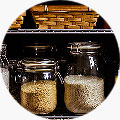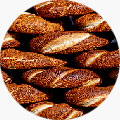The ancient super grain that's perfect for your modern kitchen
Bulgur wheat is a nutritious and versatile whole grain that has been enjoyed for centuries. Made from cracked parboiled wheat kernels, it's a pantry staple that can be used in countless dishes. Whether you're looking for a healthy and satisfying side dish, a hearty salad base, or a protein-packed vegetarian main course, bulgur wheat is up to the challenge.
What is Bulgur Wheat?
Bulgur wheat is made from durum wheat, a hard wheat variety that's high in protein and fiber. The wheat kernels are parboiled, which means they're partially cooked before being cracked. This process gives bulgur wheat its unique chewy texture and nutty flavor. Bulgur wheat is also available in different grind sizes, from fine to coarse, so you can choose the perfect one for your recipe.
Health Benefits of Bulgur Wheat
Bulgur wheat is a nutritional powerhouse. It's a good source of protein, fiber, vitamins, and minerals. Here are just a few of the health benefits of bulgur wheat:
- High in fiber: Bulgur wheat is a great source of dietary fiber, which can help to promote digestive health and keep you feeling full longer.
- Good source of protein: Bulgur wheat is a good source of plant-based protein, making it a great option for vegetarians and vegans.
- Low in fat: Bulgur wheat is naturally low in fat, making it a healthy choice for people who are watching their weight.
- Good source of vitamins and minerals: Bulgur wheat is a good source of manganese, magnesium, iron, and phosphorus.
How to Cook Bulgur Wheat
Bulgur wheat is incredibly easy to cook. Unlike other whole grains, such as quinoa or brown rice, it doesn't require soaking or rinsing. Simply simmer bulgur wheat in water or broth for about 15-20 minutes, or until it's tender and cooked through. The ratio of bulgur wheat to liquid is typically 1:2.
Once cooked, bulgur wheat can be used in a variety of ways, such as:
- Salads: Bulgur wheat adds a delicious nutty flavor and satisfying texture to salads. Try it in a Mediterranean salad with tomatoes, cucumbers, olives, and feta cheese, or a tabbouleh salad with parsley, mint, and lemon juice.
- Stuffed vegetables: Bulgur wheat makes a great stuffing for peppers, tomatoes, zucchini, or eggplant. Try it with your favorite ground meat or vegetables, or go vegetarian with a lentil and mushroom stuffing.
- Soups and stews: Bulgur wheat can be added to soups and stews for extra heartiness and nutrition. Try it in a lentil soup, a chili, or a minestrone.
- Pilafs: A pilaf is a rice dish that can be made with bulgur wheat instead of rice. Try a Turkish pilaf with saffron and pine nuts, or a Moroccan pilaf with raisins and almonds.
- Breakfast porridge: Bulgur wheat can be cooked with milk and cinnamon for a healthy and filling breakfast porridge. Top it with your favorite fruits, nuts, and seeds.
Tips for Cooking Bulgur Wheat
- Use a fine grind bulgur wheat for salads and stuffings, and a coarse grind bulgur wheat for pilafs and soups.
- Toasting bulgur wheat in a dry pan before cooking can enhance its nutty flavor.
- Add your favorite herbs and spices to bulgur wheat for extra flavor.
- Leftover bulgur wheat can be stored in an airtight container in the refrigerator for up to 5 days.
Greece: 🇬🇷 Crossing the Aegean, we arrive in Greece, where bulgur takes on a more poetic turn. Here, it's known as "πλιγούρι" (pronounced "plee-goori"), a name evocative of its sun-kissed origins and earthy charm.
Bulgaria: 🇧🇬 It all begins where it all began – Bulgaria, the cradle of bulgur itself. Here, the grain reigns supreme, known simply as "булгур" (pronounced "bool-goor"). This straightforward moniker reflects the deep-rooted connection between the land and its bounty.
Serbia and Montenegro: 🇷🇸 🇲🇪 Moving north, we find Serbians and Montenegrins referring to bulgur as "пшеница" (pronounced "pshenitsa"), which translates to "wheat." This reflects the grain's versatility, often used interchangeably with traditional wheat in various dishes.
Albania: 🇦🇱 In Albania, bulgur gets a delightful twist, called "grurë" (pronounced "groo-reh"). This melodic name hints at the grain's satisfying texture and nutty aroma, whetting the appetite for culinary adventures.
Bosnia and Herzegovina: 🇧🇦 In Bosnia and Herzegovina, bulgur echoes its Serbian and Montenegrin cousin, known as "pšenica." This shared term underscores the cultural and culinary interconnectedness of the region.
North Macedonia: 🇲🇰 North Macedonia adds a touch of flair to the bulgur story. Here, it's called "булгур" (pronounced "bool-goor"), the same as in Bulgaria, but often accompanied by the descriptive "ситна пшеница" (pronounced "sitna pshenitsa"), meaning "fine wheat," highlighting the specific grind preferred in Macedonian cuisine.
Romania: 🇷🇴 Our Balkan odyssey concludes in Romania, where bulgur finds a familiar home. Romanians call it simply "bulgur," a testament to the grain's widespread popularity and shared heritage across the region.
Poland:
- Kasza bulgur: This is the most common and direct translation, meaning "bulgur groats."
- Pęczak: This term refers to cracked grains in general, and can encompass bulgur alongside other grains like barley or rye.
Russia:
- Булгур (bulgur): Similar to Poland, the Russian term adopts the original "bulgur" with Cyrillic alphabet.
- Пшеничная крупа (pshenichnaya krupa): This translates to "wheat крупа," where "крупа" is a broad term for various cracked grains.
Ukraine:
- Булгур (bulgur): Just like Russia, Ukraine sticks to the familiar "bulgur."
- Пшенична крупа (pshenychna krupa): Similar to the Russian term, this signifies "wheat крупа."
Estonia:
- Bulgur: Simplicity reigns here, with the Estonian language adopting the original name directly.
Latvia:
- Bulgurs: The Latvian term adds an "s" at the end, making it "bulgurs."
Scandinavia:
- Bulgur: Across Denmark, Norway, and Sweden, the original "bulgur" finds its home comfortably.
Order Bulgur Wheat Online Today!
Ready to experience the versatility and deliciousness of bulgur wheat? Order a bag of our high-quality bulgur wheat online today! We offer a variety of grind sizes to suit your needs, and our bulgur wheat is always fresh and flavorful. With its quick cooking time and endless possibilities, bulgur wheat is sure to become a new favorite in your kitchen.
Shop now and discover the power of ancient grains!
Type of Meals the Product can be used in
*Soups *Meat Meals *Stuffing *Vegetable Meals *Pilafs *Desserts
Preparation Tip for Product
Don’t wash and soak prior to cooking. When cooking bulgur, please use 2 cups of hot water for each cup of bulgur you want to cook.
Nutrition Facts
Serving size: 60 gr.
Nutrition facts are calculated on 60 gr. dry material, over 2000 kcal for adults.
| Nutrients | Amount | % Daily Value |
|---|
| Calories |
208 |
10.4% |
| Fat |
1.0 g |
1.5% |
| Carbohydrate |
41.6 g |
13.4% |
| Sugar |
1.7 g |
1.8% |
| Fiber |
4.9 g |
19.6% |
| Protein |
6.6 g |
13.2 % |
| Salt |
0.04 g |
1.7 % |












